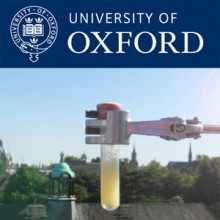
Relevant Links
It was here in Oxford, in the 1600s, that great minds such as Hooke, Boyle, Willis and Wren laid the foundations of modern experimental science. Like their famous forebears, today's Oxford scientists continue to undertake world-leading research: making fundamental new discoveries and applying cutting-edge knowledge to the major societal and technological challenges of the day. The research happening right now in the Department of Chemistry is uniquely poised to have a major impact on everything from our health to our energy sources - in other words, it is enabling our shared future. To read more about our research, please visit http://www.chem.ox.ac.uk/researchthemes.asp.
This series focuses on a potential solution to the energy crisis: using artificial photosynthesis to generate 'clean' hydrogen fuel from sunlight and water. This interdisciplinary research incorporates elements of chemistry and biology, and aims to mimic and improve processes used in nature by green plants and pathogenic bacteria.
Armstrong Group: http://armstrong.chem.ox.ac.uk/
Solar Fuels: http://solarfuels.tumblr.com/
This research was also featured at the Royal Society Summer Exhibition 2013 http://sse.royalsociety.org/2013/exhibits/solar-fuels/
| # | Episode Title | Description | People | Date | |
|---|---|---|---|---|---|
| 5 | Introduction to Solar Fuels | In an 'Oxford tutorial' style podcast, Professor Fraser Armstrong introduces the concept of artificial photosynthesis: coupling a light harvesting material with a fuel producer in order to generate storable energy from sunlight. | Fraser Armstrong | 19 Jul 2013 | |
| 4 | Enzymes as Fuel Producers | Growing energy demand worldwide is a crucial challenge for chemists. Suzannah Hexter, Armstrong Group, shows how, with the help of enzymes, the principles of photosynthesis may be artificially exploited and improved to provide a clean energy resource. | Suzannah Hexter | 19 Jul 2013 | |
| 3 | Photosynthesis in Nature | Dr Alison Foster, a former chemist and Senior Curator at the University of Oxford Botanic Garden explains the principals of natural photosynthesis that the Armstrong Group is trying to mimic in the lab. | Alison Foster | 19 Jul 2013 | |
| 2 | Artificial Photosynthesis - From Photon to Fuel | Andrea Bachmeier, a DPhil student in the Armstrong Group, is helping to create a fully integrated artificial photosynthesis (APS) system which could be much more efficient at turning sunlight into fuel than living systems. | Andreas Bachmeier | 19 Jul 2013 | |
| 1 | Conclusion: Inspired by Nature | The current energy crisis is a time of intense challenges but also of opportunities for fantastic science and innovative ideas. | Alex T. Vai | 19 Jul 2013 |
